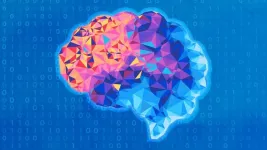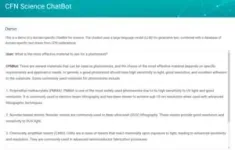(Press-News.org) The Global Alliance for Genomics and Health (GA4GH) and the International Neuroinformatics Coordinating Facility (INCF) launched a new group to lay the groundwork for connecting global neuroscience and genomic data.
Answering data-driven questions in neuroscience means dealing with complexity: in types of data, data management systems, the number and variety of conditions, ethical and legal requirements, and the genetic and biological conditions themselves. Even just aligning industry standards for neuroimaging and genomics can be a struggle.
To improve life for people with neurological conditions, we need to tackle the complexity together.
The new GA4GH & INCF Neuroscience Community unites collaborators from around the world to share best practices and improve standards that will expand responsible use of neuroscientific data, including genomic data. Interested organisations can join today.
Without connected data, neuroscience will remain painfully unexplained
A parent wants to understand why their autistic five-year-old wakes up multiple times a night, but doctors can’t explain. A person with early-onset Parkinson’s struggles to find a cocktail of medications that wards off the symptoms but doesn’t make them sleepy, irritable, and confused on the job. Someone has tried every treatment for severe depression that their insurance will pay for, but nothing works.
For people with neurological conditions and their families, the healthcare system can seem to offer more headache than help.
Those with illnesses like Parkinson’s, addiction, depression, and epilepsy often report worse quality of life than others. So do many neurodivergent people, including autistic people and those with ADHD. For example, people with epilepsy are at greater risk of dying early. Many autistic children face gastrointestinal and sleep problems.
Progress has been slow to tailor healthcare for neurodivergent people and neurological patients. In part, that’s because researchers need lots and lots of data — and many different types of data — to answer neuroscience questions.
“To fully understand just one neurological patient or research participant, you need brain images, genomic sequences, gene expression data, socio-cultural factors, test results showing how they metabolise drugs, their overall health history and their family’s, and biomarker data like health and weight. Then add a detailed work-up of their phenotype, or the traits, behaviours, and symptoms they show,” said neuroscientist Randy McIntosh, Co-Lead of the GA4GH & INCF Neuroscience Community, Deputy Chair of the INCF Governing Board, and professor at Simon Fraser University.
“Now multiply that amount of data by thousands of people, which you need to get real predictive power in a study,” he said.
A single organisation is unlikely to collect or manage so much data. Yet sharing data between groups is difficult, in part for an important reason: stewarding someone’s data means taking great care to protect their privacy, wishes, and legal rights.
One solution is data visiting.
Instead of downloading a data file and transferring it to a faraway scientist, data visiting means that a scientist visits the data where it lives. These days, data visiting is done virtually: algorithms or other computer tools travel to an institution’s trove of data, or a secure environment where many institutions share their data, and run tests. Then they send the results to scientists with proper access permissions.
To visit the most data possible, you need a “federated network” — where you can study data housed in many different locations, all at once.
No matter your access method, you need to use data responsibly. Groups like the Wellcome-funded Brain Research International Data Governance & Exchange Program (BRIDGE) — a Neuroscience Community member — are studying how to properly follow laws and regulations when making data available worldwide. BRIDGE works with partners in Brazil, the US, South Africa, Switzerland, and the UK to develop resources for governing neuroscience data.
“Conditions and diseases don’t respect borders. If we want the lives of people with neurological conditions to improve, we can’t just look at data from one hospital or even one country. We have to study diverse data from around the world. With data visiting powered by federation and Global Alliance for Genomics and Health standards, clinicians and researchers can vastly expand their pool of data — while data stewards rest easy knowing they are protecting rights and following regulations,” said Peter Goodhand, CEO of GA4GH.
Making connections between neural networks: a new Neuroscience Community
The GA4GH & INCF Neuroscience Community will connect international partners to develop the standards, collaborations, and systems needed to power data visiting across a global network.
The community will help get answers faster for patients and people everywhere, while respecting the human rights of people who donate their data. (Read the community’s in-progress charter.)
“For nearly two decades, INCF has developed standards and best practices to make neuroscience data FAIR: findable, accessible, interoperable, and reusable. Now we are eager to work with partners from genomics, like GA4GH, to ensure that our standards development efforts progress together and lead to the best possible science,” said Mathew Abrams, Director of Science and Training for INCF.
The GA4GH & INCF Neuroscience Community will expand neuroscience and genomic data networking around the world — ramping up what many members are already doing.
In Ontario, Canada, for example, several Neuroscience Community members run projects to link data across the province and the globe.
Take software company DNAstack. Working closely with the Autism Sharing Initiative (a GA4GH Driver Project), the company developed the Neuroscience AI network with its existing Omics AI software. The network makes it easier to find, analyse, and apply artificial intelligence to autism and other neuroscience datasets.
Then Azadeh Kushki, a researcher at Holland Bloorview Kids Rehabilitation Hospital — also a Neuroscience Community member — arrived. She used Neuroscience AI to make an important discovery: neurodivergent kids might be prescribed medication differently based on their ethnicity and family income.
The finding relied on a machine learning model trained on a federated network that follows GA4GH standards. Thanks to the Neuroscience Community, other groups will learn how to apply this powerful technique.
Another Neuroscience Community member, the Ontario Brain Institute, scaled up even further. Its Brain-CODE platform includes not only neurodevelopmental but also concussion, mental health, cerebral palsy, epilepsy, and neurodegenerative data. Brain-CODE houses data from more than 20,000 people who agreed to give researchers and other third parties access.
“For more than 10 years, the Ontario Brain Institute has fostered an integrated approach for neuroscience discovery to improve brain health. By combining ideas and expertise from patients, researchers, and industry, we’ve created a powerful ecosystem of innovation using data, analytics, and AI. But we can’t do this alone. With the GA4GH & INCF Neuroscience Community, we have a genuinely international opportunity to combine efforts and reach breakthroughs faster,” said Francis Jeanson, Head of the Centre for Analytics at Ontario Brain Institute and Co-Lead of the GA4GH & INCF Neuroscience Community.
The new Neuroscience Community is one of several Communities of Interest founded in recent years by GA4GH. These groups bring together global experts who focus on a specific topic, and who are eager to connect across borders and find a path to better data use.
“Great work is happening all over the world to understand neurological conditions, including their genomic underpinnings. The GA4GH & INCF Neuroscience Community will ensure that all those experts are sharing best practices, developing interoperable standards, and building connections across data,” said Angela Page, GA4GH Director of Strategy and Engagement. “People with neurological conditions have advocated for and deserve a global data network that will lead to better healthcare and improved quality of life.”
#
About GA4GH
The Global Alliance for Genomics and Health (GA4GH) is an international, not-for-profit alliance formed in 2013 to accelerate progress in human health by expanding responsible use of genomic data. Bringing together 500+ leading organisations working in healthcare, research, patient advocacy, life science, and information technology, the GA4GH community creates frameworks and standards that power the responsible, broad, and democratised use of genomic and related health data.
About INCF
The International Neuroinformatics Coordinating Facility (INCF) network serves as a forum to collaboratively coordinate global neuroinformatics activities that guide and oversee the development of standards, best practices, ontologies, and other unifying activities. The mission of INCF network is to promote the uptake of FAIR data management practices in neuroscience through the development of standards and best practices that support open, FAIR, and citable neuroscience. INCF also provides training on how standards and best practices facilitate reproducibility and enables the publishing of the entirety of research output, including data and code.
END
Two leading standards bodies launch Neuroscience Community, powering a global data network that will speed up answers in autism, Parkinson’s, addiction, and more
The Global Alliance for Genomics and Health (GA4GH) and the International Neuroinformatics Coordinating Facility (INCF) welcome organizations worldwide to join the new community
2023-12-01
ELSE PRESS RELEASES FROM THIS DATE:
Novel screening tool and recovery program may help reduce mental health problems after trauma
2023-12-01
Key takeaways
A new mental health screening tool accurately predicts mental health outcomes for hospitalized trauma patients.
To be sustainable, mental health screening and recovery programs should be tailored to each trauma center, with the engagement of all stakeholders, a related study finds.
Studies shed light on the need for trauma centers to provide injured patients with mental health resources, such as online education, support, and referrals to mental healthcare providers when needed.
CHICAGO (December 1, 2023): A novel screening ...
Black men with advanced prostate cancer less likely to receive crucial treatment, study finds
2023-12-01
A new study led by investigators at the UCLA Health Jonsson Comprehensive Cancer Center found Black men diagnosed with more advanced stages of prostate cancer are significantly less likely to be prescribed novel hormone therapy than other racial and ethnic groups – including white or Latino men – despite the therapy being proven to effectively control the growth of prostate tumors and extend the lives of men with the disease.
The findings, published in JAMA Network Open, reveal a concerning racial disparity in the utilization of the crucial therapy for the treatment of the disease.
“This revelation is particularly concerning ...
Trends in adult smoking prevalence
2023-12-01
About The Study: This analysis of survey data from 353,000 U.S. adults found that smoking prevalence decreased from 2011 to 2022 in all age groups except adults 65 years or older, with faster decreases among younger than older adults. These findings suggest that the greatest gains in terms of reducing smoking-attributable morbidity and mortality could be achieved by focusing on individuals with low socioeconomic status, as this population has the highest smoking rates and the worst health prospects.
Authors: Rafael ...
Racial and ethnic disparities in use of recommended therapies for atherosclerotic cardiovascular disease, 1999-2020
2023-12-01
About The Study: In this study of 5,218 adults with atherosclerotic cardiovascular disease, significant disparities persisted between current care and optimal care, surpassing any differences observed among demographic groups. These findings highlight the critical need for sustained efforts to bridge these gaps and achieve better outcomes for all patients, regardless of their racial and ethnic backgrounds.
Authors: Harlan M. Krumholz, M.D., S.M., of Yale New Haven Hospital in New Haven, Connecticut, is the corresponding author.
To access the embargoed study: Visit our For The Media website at this link https://media.jamanetwork.com/
(doi:10.1001/jamanetworkopen.2023.45964)
Editor’s ...
Researchers caution diabetes patients’ use of fitness video games
2023-12-01
The authors of a new study are warning people with type-1 diabetes to use fitness video games with caution.
The study by Staffordshire University and Federal University of Vale do Sao Francisco has found that ‘exergames’ can change people’s perceptions of how fatigued they are – which is potentially harmful for those with the condition.
Dr Pooya Soltani, Senior Lecturer in Games Technology at Staffordshire University, explained: “Type-1 diabetes patients need to control their blood glucose regularly, both before and after exercise, to prevent complications. As part of this, it is important to regulate the intensity of exercise, ...
Flexible parental leave among immigrant mothers can promote integration
2023-12-01
Mothers who took parental leave part-time or for shorter periods were more likely to engage in income-generating activities or pursue education. A new study uncovers surprising patterns in parental leave usage among newly arrived migrant women in Sweden, specifically focusing on their integration into the labor market.
The findings, published in the Journal of European Social Policy, provide new insights into how parental leave is used and how it affects labor market participation among newly arrived mothers who arrived in Sweden with young children.
The analysis reveals a polarization in the use of parental leave, with a significant number of mothers refraining ...
When scholars meet their sponsors
2023-12-01
FRANKFURT. The principle that stands behind the Deutschlandstipendium is as simple as it is striking: every euro raised by universities each year is doubled by Germany’s Federal Ministry of Education and Research. Goethe University Frankfurt raised €990,000 this year, bringing the total funding available to Deutschlandstipendium scholars to €1,980,000. This means that 550 students – about one third of whom have a migrant background – can receive €300 per month for a maximum of two years. For ...
Three award-winning Goethe University personalities
2023-12-01
FRANKFURT. The three academics honored at Goethe University yesterday evening “conduct extraordinary scientific work, and, at the same time", in the words of University President Enrico Schleiff, "they let others share in the results of and profit from this science – in a manner that far exceeds the economic component of this term." In so doing, they stand for an essential feature of Goethe University, namely "that we do not keep the treasures of knowledge we have gathered to ourselves, but consciously share them: in the scientific world, ...
The world needs more empathy—here is how science can harness it
2023-12-01
In a world grappling with deep-seated division and social upheaval, empathy has become more critical than ever.
But science suggests when it comes to evoking empathy, our imagination is more powerful than we previously thought. A new study, led by McGill researchers, reveals how the different ways to experience empathy affect our willingness to help others.
“Empathy is the ability to understand the situation of another person and is vital for prosocial behaviours. However, we know that empathy ...
Prioritizing housing goals may positively impact quality of life and independent living for people with disabilities
2023-12-01
East Hanover, NJ – December 1, 2023 – Housing that fails to meet the needs of people with disabilities may have far-reaching consequences. Living situations that impede independence and community integration, for example, can adversely affect health and wellbeing over the long term. More than 70% of people with spinal cord injury use wheelchairs and other assistive technology, complicating their search for affordable, accessible housing. Despite the magnitude of this problem, little research has been conducted on residential mobility patterns among people with acquired disabilities, including spinal cord injury.
Data from the ...
LAST 30 PRESS RELEASES:
Massage Therapy Foundation awards $300,000 research grant to the University of Denver
Gastrointestinal toxicity linked to targeted cancer therapies in the United States
Countdown to the Bial Award in Biomedicine 2025
Blood marker from dementia research could help track aging across the animal world
Birds change altitude to survive epic journeys across deserts and seas
Here's why you need a backup for the map on your phone
ACS Central Science | Researchers from Insilico Medicine and Lilly publish foundational vision for fully autonomous “Prompt-to-Drug” pharmaceutical R&D
Increasing the number of coronary interventions in patients with acute myocardial infarction does not appear to reduce death rates
Tackling uplift resistance in tall infrastructures sustainably
Novel wireless origami-inspired smart cushioning device for safer logistics
Hidden genetic mismatch, which triples the risk of a life-threatening immune attack after cord blood transplantation
Physical function is a crucial predictor of survival after heart failure
Striking genomic architecture discovered in embryonic reproductive cells before they start developing into sperm and eggs
Screening improves early detection of colorectal cancer
New data on spontaneous coronary artery dissection (SCAD) – a common cause of heart attacks in younger women
How root growth is stimulated by nitrate: Researchers decipher signalling chain
Scientists reveal our best- and worst-case scenarios for a warming Antarctica
Cleaner fish show intelligence typical of mammals
AABNet and partners launch landmark guide on the conservation of African livestock genetic resources and sustainable breeding strategies
Produce hydrogen and oxygen simultaneously from a single atom! Achieve carbon neutrality with an 'All-in-one' single-atom water electrolysis catalyst
Sleep loss linked to higher atrial fibrillation risk in working-age adults
Visible light-driven deracemization of α-aryl ketones synergistically catalyzed by thiophenols and chiral phosphoric acid
Most AI bots lack basic safety disclosures, study finds
How competitive gaming on discord fosters social connections
CU Anschutz School of Medicine receives best ranking in NIH funding in 20 years
Mayo Clinic opens patient information office in Cayman Islands
Phonon lasers unlock ultrabroadband acoustic frequency combs
Babies with an increased likelihood of autism may struggle to settle into deep, restorative sleep, according to a new study from the University of East Anglia.
National Reactor Innovation Center opens Molten Salt Thermophysical Examination Capability at INL
International Progressive MS Alliance awards €6.9 million to three studies researching therapies to address common symptoms of progressive MS
[Press-News.org] Two leading standards bodies launch Neuroscience Community, powering a global data network that will speed up answers in autism, Parkinson’s, addiction, and moreThe Global Alliance for Genomics and Health (GA4GH) and the International Neuroinformatics Coordinating Facility (INCF) welcome organizations worldwide to join the new community




